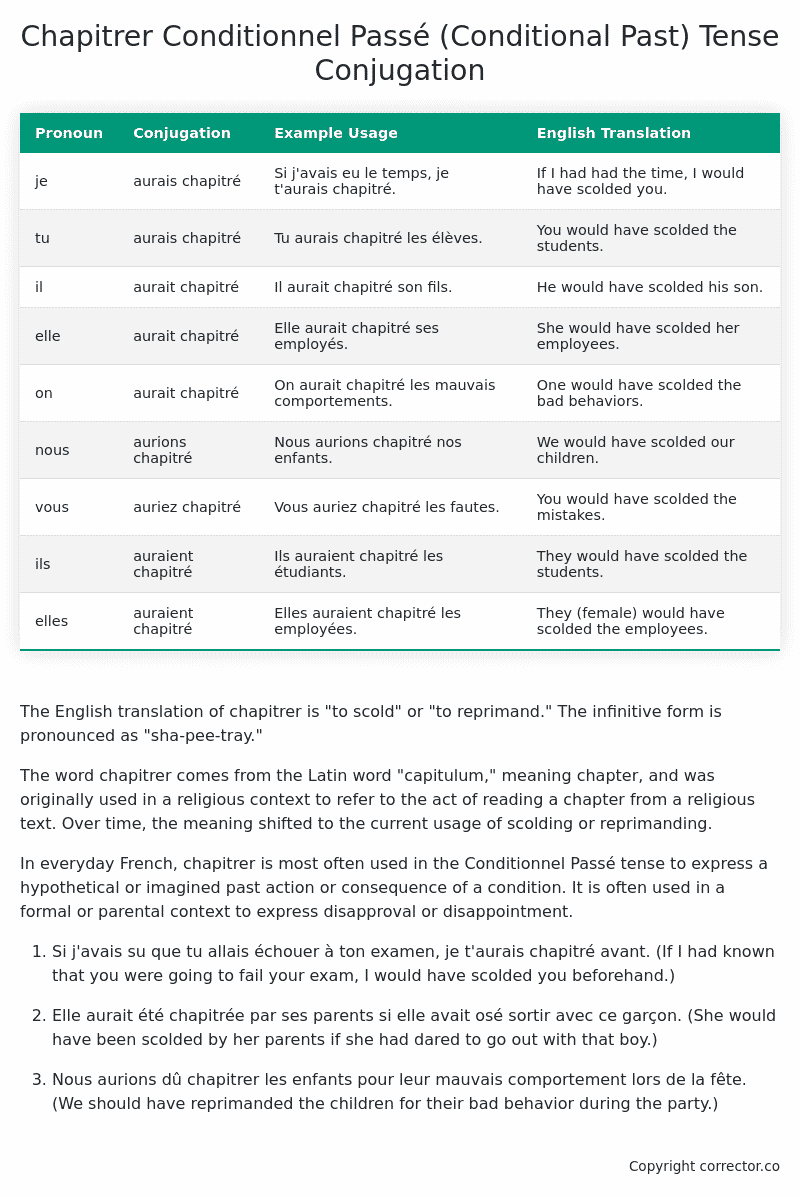Conditionnel Passé (Conditional Past) Tense Conjugation of the French Verb chapitrer
Introduction to the verb chapitrer
The English translation of chapitrer is “to scold” or “to reprimand.” The infinitive form is pronounced as “sha-pee-tray.”
The word chapitrer comes from the Latin word “capitulum,” meaning chapter, and was originally used in a religious context to refer to the act of reading a chapter from a religious text. Over time, the meaning shifted to the current usage of scolding or reprimanding.
In everyday French, chapitrer is most often used in the Conditionnel Passé tense to express a hypothetical or imagined past action or consequence of a condition. It is often used in a formal or parental context to express disapproval or disappointment.
-
Si j’avais su que tu allais échouer à ton examen, je t’aurais chapitré avant. (If I had known that you were going to fail your exam, I would have scolded you beforehand.)
-
Elle aurait été chapitrée par ses parents si elle avait osé sortir avec ce garçon. (She would have been scolded by her parents if she had dared to go out with that boy.)
-
Nous aurions dû chapitrer les enfants pour leur mauvais comportement lors de la fête. (We should have reprimanded the children for their bad behavior during the party.)
Table of the Conditionnel Passé (Conditional Past) Tense Conjugation of chapitrer
| Pronoun | Conjugation | Example Usage | English Translation |
|---|---|---|---|
| je | aurais chapitré | Si j’avais eu le temps, je t’aurais chapitré. | If I had had the time, I would have scolded you. |
| tu | aurais chapitré | Tu aurais chapitré les élèves. | You would have scolded the students. |
| il | aurait chapitré | Il aurait chapitré son fils. | He would have scolded his son. |
| elle | aurait chapitré | Elle aurait chapitré ses employés. | She would have scolded her employees. |
| on | aurait chapitré | On aurait chapitré les mauvais comportements. | One would have scolded the bad behaviors. |
| nous | aurions chapitré | Nous aurions chapitré nos enfants. | We would have scolded our children. |
| vous | auriez chapitré | Vous auriez chapitré les fautes. | You would have scolded the mistakes. |
| ils | auraient chapitré | Ils auraient chapitré les étudiants. | They would have scolded the students. |
| elles | auraient chapitré | Elles auraient chapitré les employées. | They (female) would have scolded the employees. |
Other Conjugations for Chapitrer.
Le Present (Present Tense) Conjugation of the French Verb chapitrer
Imparfait (Imperfect) Tense Conjugation of the French Verb chapitrer
Passé Simple (Simple Past) Tense Conjugation of the French Verb chapitrer
Passé Composé (Present Perfect) Tense Conjugation of the French Verb chapitrer
Futur Simple (Simple Future) Tense Conjugation of the French Verb chapitrer
Futur Proche (Near Future) Tense Conjugation of the French Verb chapitrer
Plus-que-parfait (Pluperfect) Tense Conjugation of the French Verb chapitrer
Passé Antérieur (Past Anterior) Tense Conjugation of the French Verb chapitrer
Futur Antérieur (Future Anterior) Tense Conjugation of the French Verb chapitrer
Subjonctif Présent (Subjunctive Present) Tense Conjugation of the French Verb chapitrer
Subjonctif Passé (Subjunctive Past) Tense Conjugation of the French Verb chapitrer
Subjonctif Imparfait (Subjunctive Imperfect) Tense Conjugation of the French Verb chapitrer
Subjonctif Plus-que-parfait (Subjunctive Pluperfect) Tense Conjugation of the French Verb chapitrer
Conditionnel Présent (Conditional Present) Tense Conjugation of the French Verb chapitrer
Conditionnel Passé (Conditional Past) Tense Conjugation of the French Verb chapitrer (this article)
L’impératif Présent (Imperative Present) Tense Conjugation of the French Verb chapitrer
L’infinitif Présent (Infinitive Present) Tense Conjugation of the French Verb chapitrer
Struggling with French verbs or the language in general? Why not use our free French Grammar Checker – no registration required!
Get a FREE Download Study Sheet of this Conjugation 🔥
Simply right click the image below, click “save image” and get your free reference for the chapitrer Conditionnel Passé tense conjugation!

Chapitrer – About the French Conditionnel Passé (Conditional Past) Tense
Formation
Common Everyday Usage Patterns
Expressing Unreal Past Scenarios
Polite Requests or Suggestions
Expressing Doubt or Uncertainty
Interactions with Other Tenses
Conditional Present
Indicative Past Tenses
Conditional Future
Summary
Want More?
I hope you enjoyed this article on the verb chapitrer. Still in a learning mood? Check out another TOTALLY random French verb conjugation!


